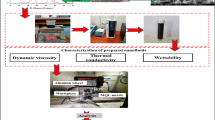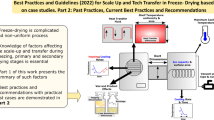Abstract
This paper concerns the thermal aspects of creep feed grinding, as contrasted to conventional grinding. The importance of adequate cooling in creep feed grinding is well known. Without cooling, the grinding temperature in creep feed grinding would be higher than in conventional grinding. Fortunately, coolant application has been seen to be very effective in reducing the grinding temperature in creep feed grinding. In fact, while cooling is more crucial in creep feed than in conventional grinding, it is also more effective in creep feed grinding.
Similar content being viewed by others
References
R. Snoeys, M. Maris and J. Peters, “Thermally induced damage in grinding”,Annals of the CIRP,27(2), pp. 571–581, 1978.
S. Malkin, “Grinding of metals: theory and application”,Journal of Applied Metalworking,3(2), pp. 95–109, 1984.
J. O. Outwater and M. C. Shaw, “Surface temperatures in grinding”,Transactions of ASME,74, pp. 73–86, 1952.
R. S. Hahn, “The Relation between grinding conditions and thermal damage in the workpiece”,Transactions of ASME,78, pp. 807–812, 1956.
N. R. DesRuisseaux and R. D. Zerkle, “Thermal analysis of the grinding process”,Journal of Engineering for Industry,92, pp. 428–434, 1970.
S. Malkin and R. B. Anderson, “Thermal aspects of grinding, Part 1—Energy partition”,Journal of Engineering for Industry,96, pp. 1177–1183, 1974.
S. Malkin, “Thermal aspects of grinding. Part 2—Surface temperatures and workpiece burn”,Journal of Engineering for Industry,96, pp. 1184–1191, 1974.
N. R. DesRuisseaux and R. D. Zerkle, “Temperature in semi-infinite and cylindrical bodies subjected to moving heat sources and surface cooling”,Journal of Heat Transfer,92, pp. 456–464, 1970.
W. J. Sauer, “Thermal aspects of surface grinding”,Proceedings of the International Grinding Conference, pp. 391–411, 1972.
D. G. Lee, R. D. Zerkle and N. R. DesRuisseaux, “An experimental study of thermal aspects of cylindrical plunge grinding”,Journal of Engineering for Industry,94, pp. 1206–1214, 1972.
G. R. Shafto, T. D. Howes and C. Andrew, “Thermal aspects of creep feed grinding”,16th Machine Tool Design Research Conference, Manchester, England, pp. 31–37, 1975.
H. Yasui and S. Tsukuda, “Influence of fluid type on wet grinding temperature”,Bulletin of Japan Society of Precision Engineering,17(2), pp. 133–134, 1983.
S. Ohishi and Y. Furukawa, “Analysis of workpiece temperature and grinding burn in creep feed grinding”,Bulletin of JSME,28(242), pp. 1775–1781, 1985.
S. Malkin,Grinding Technology: Theory and Practice of Machining with Abrasives, Ellis Horward and John Wiley, to appear.
J. C. Jaeger, “Moving sources of heat and the temperature at sliding contacts”,Proceedings of the Royal Society of New South Wales,76, pp. 203–224, 1942.
A. S. lavine, “A simple model for convective cooling during the grinding process”,Journal of Engineering for Industry,110, pp. 1–6, 1988.
K. Sato, “Grinding temperature”,Bulletin of Japan Society Grinding Engineers,1, pp. 31–33, 1961.
Author information
Authors and Affiliations
Rights and permissions
About this article
Cite this article
Lavine, A.S., Malkin, S. The role of cooling in creep feed grinding. Int J Adv Manuf Technol 5, 97–111 (1990). https://doi.org/10.1007/BF02601600
Accepted:
Issue Date:
DOI: https://doi.org/10.1007/BF02601600




